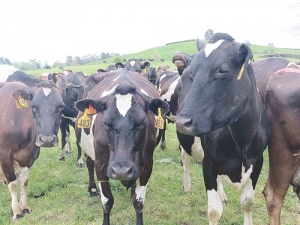While fodder beet has been grown in NZ for years, it has only recently gained popularity as an important dairy cow winter feed.
DairyNZ has advice for transitioning cows onto the supplement.
Increasing use is leading to better understanding of this crop. The key to success in feeding fodder beet to non-lactating (dry) cows is follow good practice and don't cut corners.
• Take accurate yield and dry matter (DM) measurements, especially in the crop portin to be allocated during transitioning (see 'estimating fodder beet crop yield'.)
• Transition cows carefully, slowly introducing them to fodder beet. Decrease the proportion of pasture/silage and increase the amount of fodder beet in the diet over 14-21 days.
• Start mature cows with 1-2kgDM fodder beet/cow/day and only increase by 1kgDM every second day to the required allocation. Do not keep increasing the allocation if not all the cows are eating beet or are leaving bulbs on previous days' breaks. Start heifers and rising yearlings on 1kgDM fodder beet/cow/day and only increase by 0.5kgDM every second or third day once all animals are eating.
• Rising two-year-old heifers and rising one-year-old calves will be slower to start eating the bulbs and will sometimes benefit from splitting bulbs (e.g. using a tractor wheel) to get them onto the crop.
• If transitioning onto unrestricted (ad libitum) fodder beet, do this over at least 21 days. After transitioning to 7-8kgDM fodder beet hold this allocation for seven days and then slowly increase the break line a little each day until the cows leave fodder beet behind to achieve ad libitum intake. These cows still require 2-3kgDM/day of a good quality fibre source (silage, straw, hay).
• Work out your break size accurately: measure the rows, yield and width of your paddocks. Remember cows can graze under the fence by up to 1m so include this area in the allocation.
• Offer a wide enough face of fodder beet so that all animals in the mob can access the crop at the same time. In paddocks without a grass headland to provide extra space at the start of transitioning or in very high yielding crops, consider harvesting the beets in the headland and using these for the first few days of transitioning.
• Using a time based approach (i.e. a set amount of time on crop) is not recommended as a tactic for transitioning because cows can consume 1kgDM every 15-20mins (3-4kgDM/hr) directly after the fodder beet break is opened.
• Have good electricity on fences and have a second fence very close to the feeding fence in case of break out.
• Feed supplement prior to putting cows on crop to ensure a good gut fill. Long chop baleage, silage or hay fed at least three hours before beets are offered is best.
• Check cows frequently. Individual cows transition differently, so even with well-planned transitioning acidosis can occur.
• Farmers need to look for: cows that separate themselves from the mob, are not eating, dehydrated, scouring, 'not doing well', bloating, milk fever-like symptoms, down cows or sudden death. Contact the vet immediately.



















